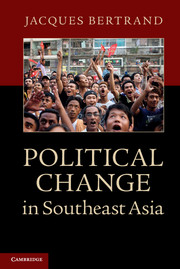Part II - State-socialist countries and authoritarian stability
Published online by Cambridge University Press: 05 June 2014
Summary
State-socialist countries often maintain stable authoritarian systems. In Southeast Asia, Vietnam and Laos are officially communist. Cambodia and Burma departed from a socialist path while maintaining strongly authoritarian regimes. All four countries experimented with state centralization and management of the economy. Subsequently, they introduced market-friendly policies, reforms to attract foreign investments and allowed more private property. In the political realm, moving away from socialist economic policies generally did not produce more political openness.
These countries all began with similar socio-economic profiles. They were agrarian economies with a large majority of their populations living off subsistence agriculture, particularly rice production. The earliest comparable figures available are the 1970s, where the average GDP per capita was $90 for Vietnam, $85 for Cambodia, $63 for Laos and slightly higher for Burma ($124) (see Table 1). They were the four poorest countries in the region during the 1970s.
War was one of the factors that undermined growth, particularly in Vietnam and Cambodia. Vietnam in particular was divided by war against the returning French colonial rulers. A communist movement developed and expanded militarily in North Vietnam, while the French regained control over the South. While a communist regime was in place as soon as the 1950s in North Vietnam, it took until 1975 to expand to the South. During most of the 1960s and early 1970s, as the French had abandoned their colonial ambitions in the region in 1954, Vietnam then fought the United States, which was concerned about the spread of communism. Cambodia was similarly caught in the struggle against the French and later the Americans, although most of the war occurred in Vietnam. Cambodia became destabilized primarily in the early 1970s, with the rise of the communist Khmer Rouge that succeeded in undermining the long-standing authoritarian regime of King Norodom Sihanouk.
- Type
- Chapter
- Information
- Political Change in Southeast Asia , pp. 141 - 148Publisher: Cambridge University PressPrint publication year: 2013



